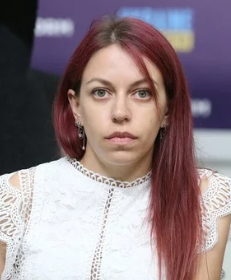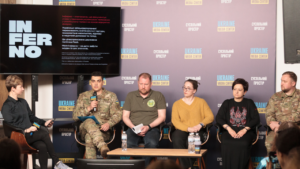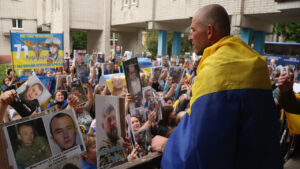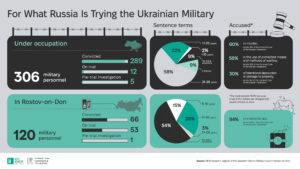“I am Ready to Fight Tooth and Nail to Bring Him Back”. How Anastasiia Hondiul is Fighting for the Release of Her Husband, an Azov Brigade Fighter, from Captivity
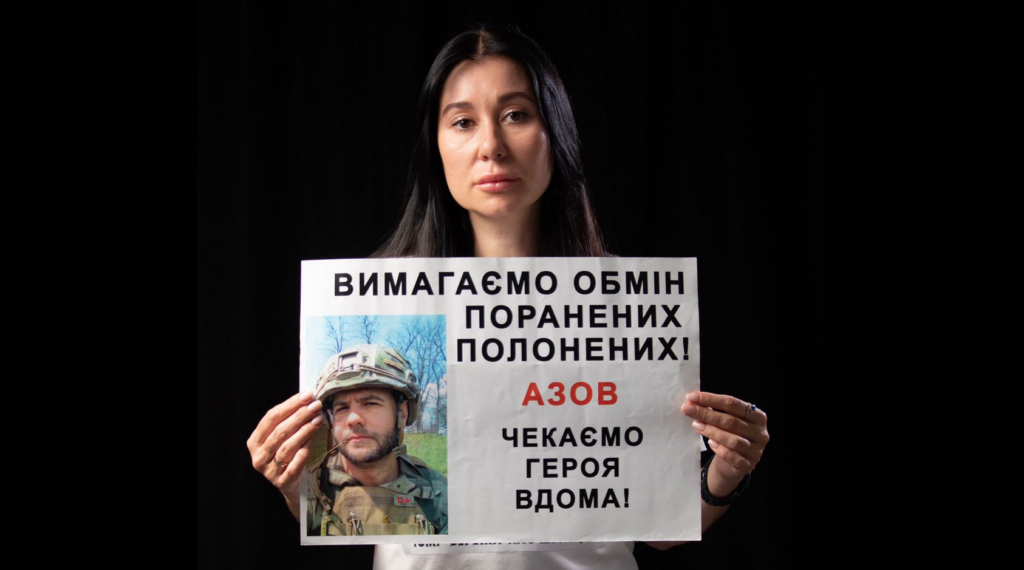
The battle for Mariupol lasted 86 days. First, in April 2022, the marines defending the line at the Illich Iron and Steel Works were captured, and in May, those who were at Azovstal ceased their fight. At the time, it was called ‘an evacuation to save lives.’ Around a hundred severely wounded Azov fighters who left Azovstal on May 16 were taken to a hospital in occupied Novoazovsk. The others were transported to the Volnovakha Correctional Colony No. 120, more commonly known as Olenivka. They were all guaranteed their lives would be safeguarded and a swift exchange would follow. However, two years later, these promises remain unfulfilled.
On the night of July 28 to 29, 2022, explosions occurred in a barrack within the colony’s industrial zone. There were nearly 200 Azov fighters inside. Over 50 of them were killed, and more than a hundred sustained severe wounds. Artem Hondiul was among them.
Azov was his dream
— He was unlike anyone I had ever known. Even though he was then only 20, he was incredibly patriotic, honest, and a man of principle, — Anastasiia Hondiul, Artem’s wife, recounts.
They met 20 years ago in their hometown of Kryvyi Rih. Artem was applying for a job, and Anastasiia interviewed him. After that, they remained close friends for many years. The girl ran her own business while Artem worked as a firefighter. Later, he signed a contract and joined the Maritime Security Guard.
— He was guarding commercial ships from Somali pirates in the Gulf of Guinea and Oman. When we started a relationship, he quit that job and joined the National Guard in Kryvyi Rih. But he still dreamed of joining Azov.
In 2019, Artem Hondiul decided to transfer to Azov, proposed to Anastasiia, and suggested they move to Mariupol together. The couple married in 2020. Despite her husband’s service, they tried to spend as much time together as possible. Whenever Artem had free time, they would travel or cook dinners together.
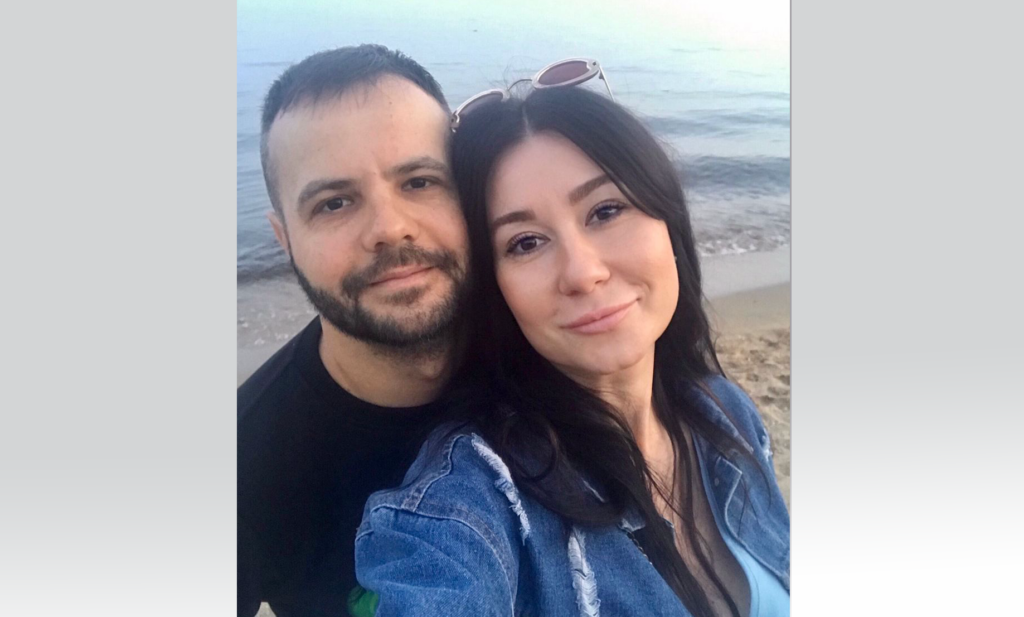
Before the full-scale war, Anastasiia and Artem spent every free moment together. Photo: Family archive
— Artem was passionate about coffee and had a whole ritual for making it. We explored all of Mariupol and often visited the village of Sartana, where they had the most delicious Chebureki. Everything was perfect, — Anastasiia recalls. — Artem had a motto: If you want peace, prepare for war. And the war did break out.
Artem Hondiul was on duty when he called his wife on February 23, telling her to quit her job, pack her things, and leave Mariupol because war was inevitable. On the morning of February 24, when he called again, the sounds of explosions could already be heard through the phone.
— My relatives were supposed to come and pick me up, but they were occupied almost immediately. I refused to escape from Mariupol, spending several days in bed, crying. Artem kept urging me to leave. As long as I stayed in Mariupol, he could not utterly commit himself to his duties.
Anastasiia left Mariupol in late February, and on March 2, she lost contact with Artem. Occasionally, she received messages from unknown numbers on her phone. ‘They wrote Artem’s call sign and a plus sign. That’s how I knew he was alive and well.’
There were no messages from March 17 to April 7. Anastasiia contacted her husband’s military unit and was informed that there was no connection in the city. They assured her that if anything happened to Artem, they would notify her.
— I was very anxious, couldn’t sleep, and was constantly crying. In early April, I dreamed that a plane had crashed in Mariupol, and I was searching for Artem among the wreckage. I expressed my anxiety in a poem that I posted on social media, — Anastasiia Hondiul recalls.
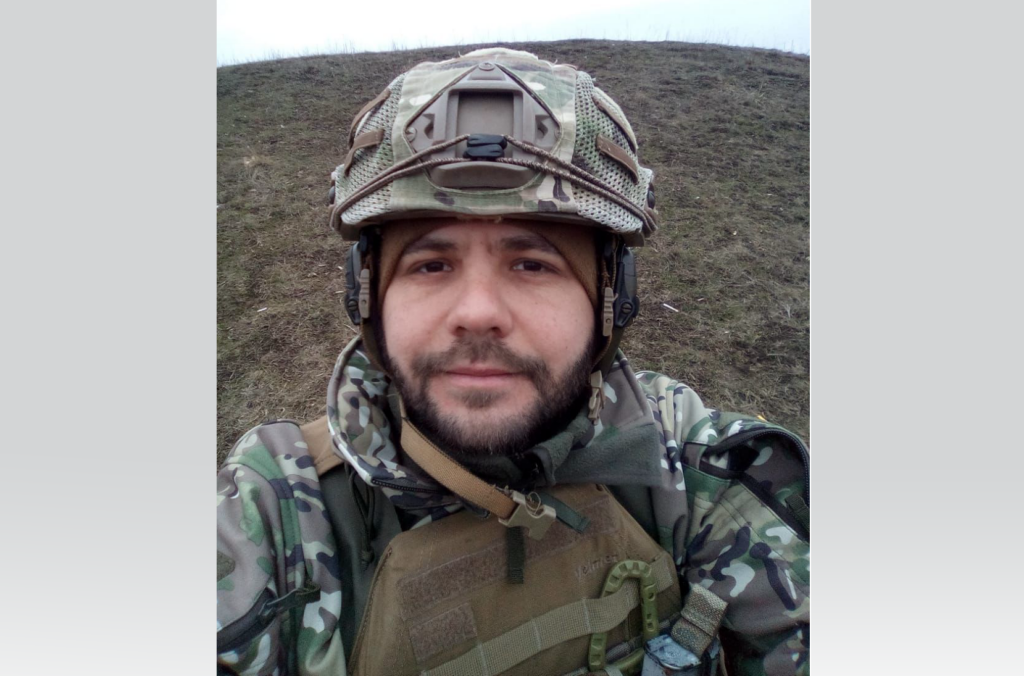
Artem Hondiul dreamed of serving in the Azov Brigade
On April 7, Artem got in touch. He did not mention that he had been wounded. In the morning the next day, Anastasiia received a call from the military unit informing her that Artem had been injured, undergone surgery, and was in the ‘Zaliziaka’— the improvised hospital set up by Ukrainian military forces at Azovstal.
— I forced Artem to admit that he had received a shrapnel wound to his pelvis. The wound was treated, but the fragment could not be removed, and it still remains in his body.
Captivity for Azov is no rescue
Anastasiia recalls after a while, Artem began experiencing depression. He even said goodbye to his life because he realized that there was no way out since even captivity was no rescue for Azov fighters. His wife tried to return the meaning of life to her husband, resorting even to emotional appeals:
— I told him that I couldn’t live a single day without him. If he wanted us to have the future, he had to survive. And it worked. He began thinking about our future: as soon as he returns, I must make him syrnyky [cheese pancakes], and he wouldn’t share them with anyone. He talked about us buying a house and getting many pets. He loved animals, and in Mariupol, he shared his last food with abandoned animals because he couldn’t bear to see them starving.
Artem was also greatly affected by how many children had lost their parents in Mariupol. Then, he texted his wife that they would adopt a child after his return. He said nothing about his captivity. On the other hand, Anastasiia hoped for a breakthrough, a ‘green corridor,’ or any other form of rescue.
From time to time, Artem would write short messages by hand, take photos of them, and send them from different phone numbers. Anastasiia received the last note on May 16, 2022, providing urgent instructions for her to follow. He also mentioned that this number was safe, so she could text him, too.
— I’m not sure if Artem received my response. A few hours later, I got a call from his military unit informing me that he had been evacuated. I didn’t even ask where.
In a panic, Anastasiia started packing a bag with things for Artem. However, her daughter stopped her, saying, ‘Mom, you don’t know where to go.’
— I called the number back and asked where Artem had been evacuated and if I could come. I was told he had been sent to the uncontrolled territory of Ukraine, the village of Olenivka. I was assured that it was not a captivity but an evacuation to save his life. And I believed it. However, unlike me, Artem’s parents realized much sooner that this was indeed captivity.
I felt that something terrible had happened
On June 18, Artem phoned from captivity. He inquired about a possible exchange, but no information was available. So the man asked Anastasiia to fight for him, to remind the world about the Azovstal defenders so they would not be forgotten. He also requested that she fill out the prisoner of war card on his behalf, as on May 16, the first day of the evacuation from Azovstal, no single representative from the ICRC was present.
The exchange did take place. On June 29, 2022, 144 prisoners were returned to Ukraine, 95 of whom were defenders of Mariupol, including 43 severely wounded Azov fighters.
Artem Hondiul was not among them. Like many of his comrades-in-arms, he was waiting for the following exchange.
— And then a tragedy happened, — Anastasiia recounts.
On the morning of July 29, 2022, the media was shaken by the terrible news, ‘An explosion occurred in Olenivka, and many prisoners have died.’
— My husband and I must have a firm emotional connection because I felt again that something terrible had happened. On the night of July 28 to 29, I had another panic attack, and in the morning, I saw the news. Deep inside, I felt that Artem was in that barrack.
In the evening of the same day, the Russian party released the lists of the wounded and dead as a result of the explosions in one of the barracks in the industrial zone of the colony. Anastasiia saw her husband’s name on the list of wounded under number 25.
No information about what had happened was available, and none of the institutions Anastasiia contacted had any details. She had to rely solely on news from Russia. It soon became clear that the explosion had occurred in a facility where only the representatives of the Azov Brigade were gathered. But could the lists released by Russia be trusted?
A month after the tragedy, videos of severely wounded Azovstal defenders in a Donetsk hospital began appearing online. Anastasiia recognized her husband in one of them.
— Artem reached out to me personally. He said, ‘Nastia, hello! Don’t worry, I’m alive and almost okay. I’m eagerly looking forward to the exchange. I love you.
Say hello to everyone, I’m doing fine.’ Then, I finally exhaled in relief.
The woman watched the video several times to understand the extent of Artem’s wounds. Anastasiia notes that her husband lost a lot of weight:
— He had the body of a teenager.
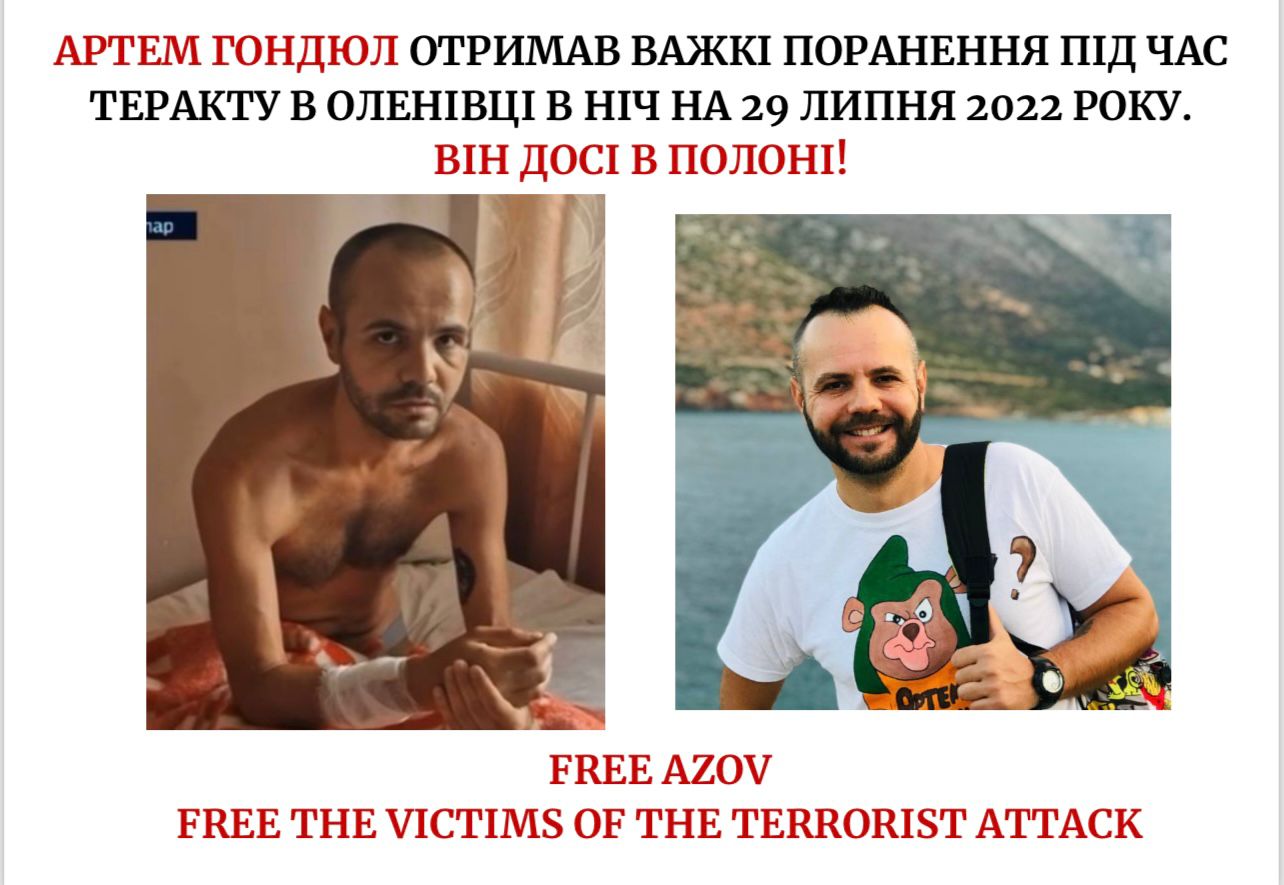
Artem Hondiul in Russian captivity and before the full-scale war. Photo: family archive
There is no official information about the wounds Artem Hondiul sustained. His wife learned from the hospital video and witness testimonies that a shrapnel piece had shattered the bone in his right arm, leaving it almost nonfunctional.
The last time Anastasiia saw her husband was in September, again on a Russian video. It was a hospital check-out.
— I saw him wearing rubber flip-flops, probably size 45, very large. His jacket was too big, with long sleeves up to his knees. Artem was walking with his head down and his hands behind his back. They were placed on a bus and told they were being sent back to Olenivka.
On September 21, 2022, one of the largest prisoner exchanges occurred. Ukraine received 205 defenders, including 108 from the Azov Brigade, 16 of whom survived the explosion in the barrack. Artem Hondiul was not among those exchanged again. Since then, there has been no information about him.
After each exchange of prisoners, you feel like you’re dying
Despite the world’s attention on the evacuation from Azovstal from May 16 to 20, 2022, most of the soldiers did not have the status of prisoner of war for a long time. For 16 months, Artem Hondiul was considered missing, even though he survived in Olenivka and repeatedly appeared in Russian videos. He was officially confirmed as a prisoner of war only in August 2023.
— I don’t know if my visit to the ICRC headquarters in Geneva impacted on changing his status. I asked them to do everything possible to confirm Artem and find him because he was wounded twice—first in Mariupol, then in Olenivka. I emphasized that they should identify all the survivors of that night and ensure they received proper medical care. The ICRC is authorized to visit prisoners of war in their places of detention, — Anastasiia Gondiul explains.
However, the woman has not received any answers about where her husband is being held or his condition.
Today, Anastasiia Hondiul is one of the activists of the public organization ‘Community of Olenivka Families.’ On every occasion, she attends each peaceful rally in support of the Azovstal prisoners, both in Ukraine and abroad.
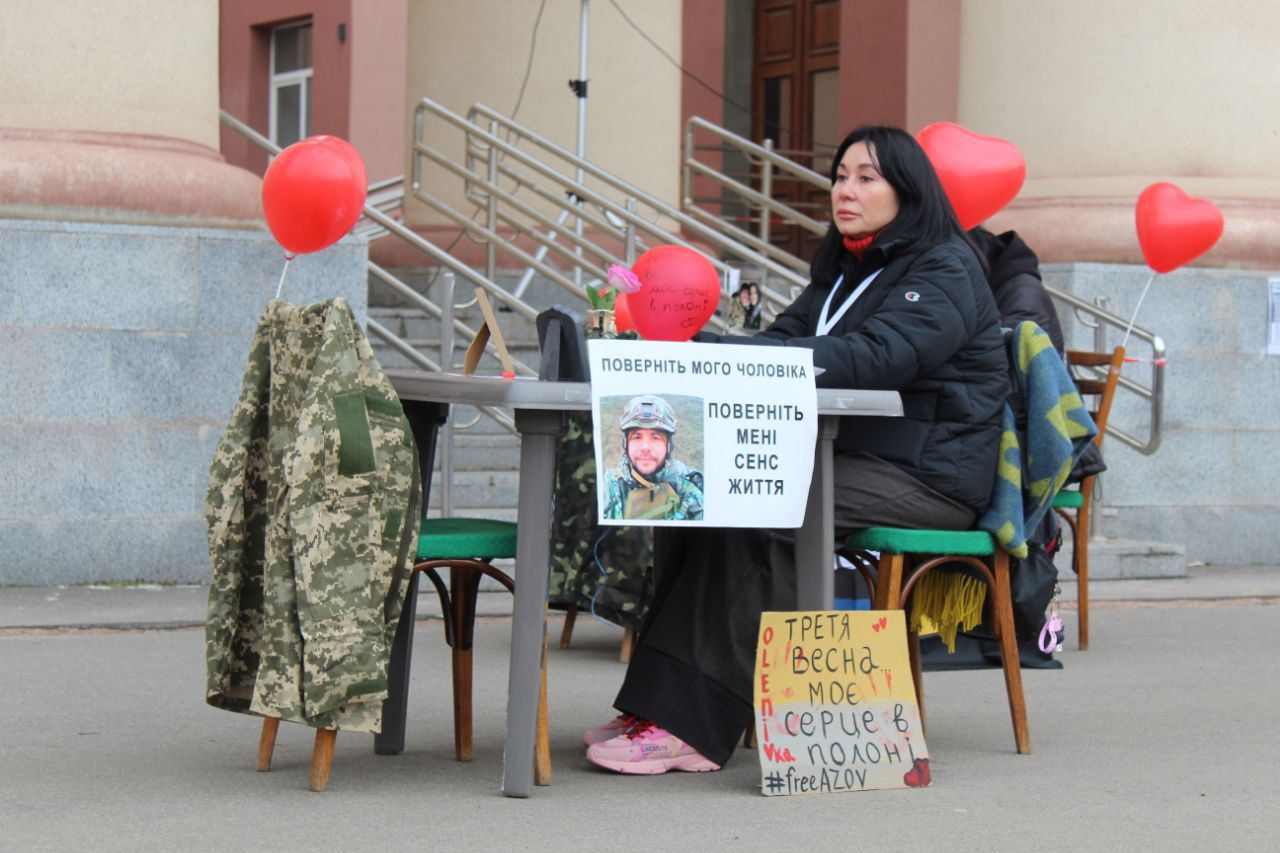
Anastasiia Hondiul became an activist with the public organization ‘Community of Olenivka Families.’ Photo: Family archive
Since May 6, 2023, time seems to have stopped for the families of the Azovstal prisoners. Since then, no Azov Brigade fighters have been returned.
— After each prisoner exchange, it feels like you are dying, and then you start to put yourself back together piece by piece. I know that my husband is currently in captivity and has been deprived of his voice, so I must become his voice here in freedom. If I don’t fight for his freedom, no one will. Artem is the sense of my life, so I am ready to fight tooth and nail and turn the world upside down to get him back.
This project is implemented with the support of the Veteran Hub. The organization may not share the views expressed within the project.


